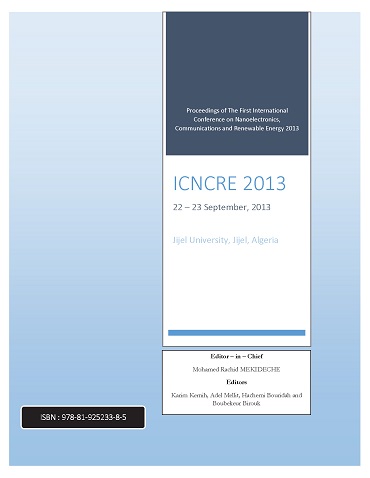- Publication Meta:Value
- Short Title:ICNCRE 2013
- Publisher:ASDF, India
- ISBN 13:978-81-925233-8-5
- ISBN 10:81-925233-8-1
- Language:English
- Type:Hard Bound - Printed Book
- Copyrights:[email protected]
- Editor-in-Chief:Mohamed Rachid Mekideche
- Conference Dates:22 - 23, September 2013
- Venue Country:Jijel, Algeria
- Submitted Papers:477
- Acceptance Rate:21.17%
- Website:www.asdf.org.in
Welcome to ASDF Electronic Digital Library!
ICNCRE 2013
ICNCRE 2013
International Conference on Nanoelectronics, Communications and Renewable Energy 2013
Paper 023
Fast Iterative Algorithms for Airborne Radar ProcessingSamira Dib
Samira Dib1, Mourad Barkat2, Malek Benslama3, Morad Grimes4
University of Jijel, King Saud University and University of Constantine.
Abstract
The conventional space-time adaptive processing (STAP) such as the sample matrix inversion (SMI) or the principal components (PC) methods are computationally costly and require the estimation of the clutter covariance matrix from secondary data, which are assumed to be independent and identically distributed. However, in monostatic airborne radar, the data are not stationary. Consequently, to circumvent such a problem, we propose to investigate the performances of adaptive recursive subspacebased algorithms of linear complexity using projection approximation subspace tracking (PAST) and orthonormal PAST(OPAST). In addition, we apply the fast implementation of the power iterations method for subspace tracking (FAPI), based on a less restrictive approximation than the well known projection approximation (API). Performance curves show that PAST, OPAST, API and FAPI algorithms do indeed allow a good detection of slow moving targets even with a low rank covariance matrix. We also show that in the case of Doppler ambiguous environment when combined a pseudo random staggered PRF, these algorithms give better results than the methods based on eigenvalues decomposition.
Keywords
Author's Profile
Author profile can be generated and linked through our partners World Book of Researchers. To include your profile online Click Here. After it is approved, please email to edlib @ asdf.res.in to create a link with all the papers.
e-AID
ICNCRE.2013.023
Cite this Article as Follows
Samira Dib, Mourad Barkat, Malek Benslama, Morad Grimes. Fast Iterative Algorithms for Airborne Radar ProcessingSamira Dib. International Conference on Nanoelectronics, Communications and Renewable Energy 2013. Vol. 1. Chennai: Association of Scientists, Developers and Faculties, 2013. 99-104. Print.
© 2010 - by EDLIB .
All Rights Reserved.

